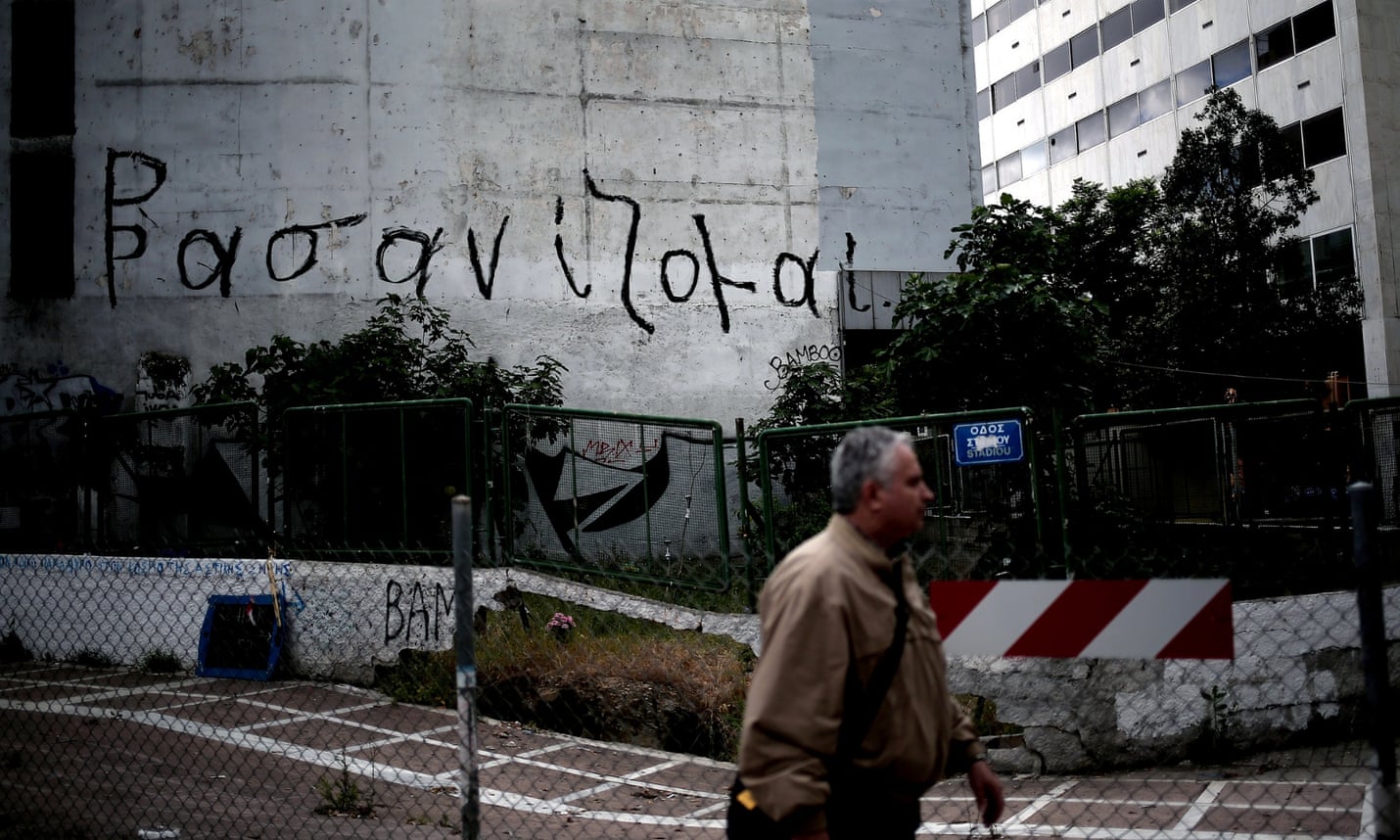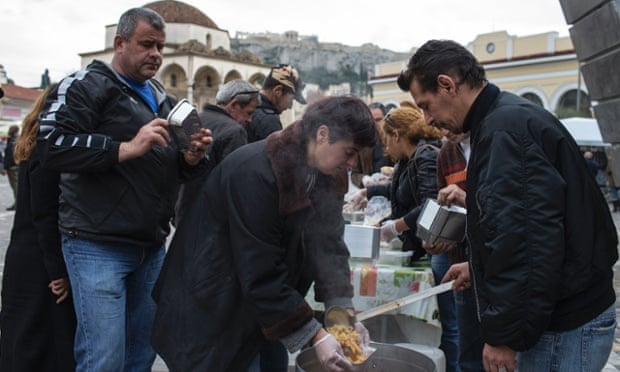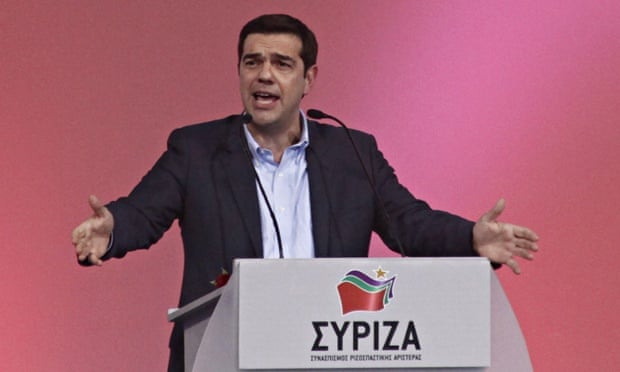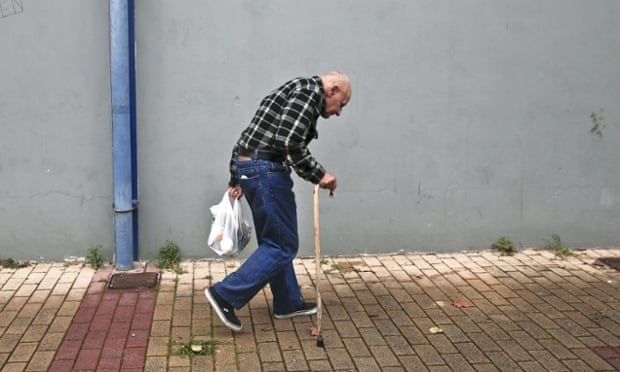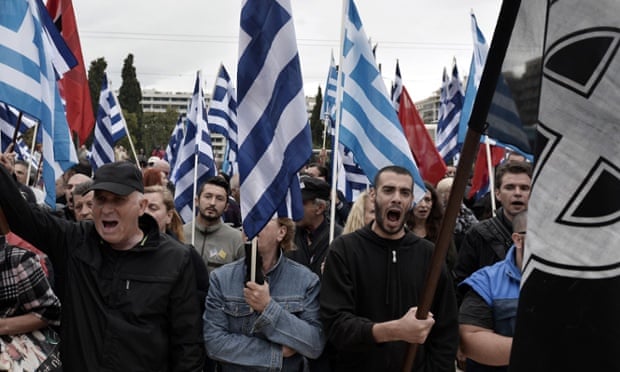Greek elections – the Guardian briefing
Helena Smith in Athens Thursday 22 January 2015
The sick man of Europe is dying and Sunday’s elections may be the tipping point. Helena Smith reports
Graffiti that says ‘I am suffering’ on a building in Athens. Photograph: Angelos Tzortzinis/AFP/Getty Images
“I will drive you to the wound of Greece. It won’t take long.” Tall, muscular and dark, Antonis is not a man given to hyperbole but he is, by his own admission, very angry. Now, staring into his rear-view mirror – only days before elections that could make or break Athens’ tumultuous ties with Europe – there is no hiding how incensed he is. “What has happened to this country is a catastrophe,” he fumes. “Our politicians, Europe, the IMF, they have stopped us having dreams.”
The journey to the wound of Greece does not take long. For Antonis, a photographer with an eye for the unusual, it is not at the end of the pot-holed road we are driving down.
It is the loss of hope. I see it every day
It is everywhere: in the mamas and papas scavenging through the rubbish bins, the broken pavements and shuttered shops, the abandoned cars and derelict houses, the new poor who mutter to themselves on graffiti-stained streets. “It is the loss of hope,” he says with a thump of his steering wheel. “I see it every day, a wound that will not heal. Please write that I, Antonis, hate this country, I hate everything about it.”
People queue for food at a soup kitchen in Athens. Photograph: Marko Djurica/Reuters
For the 43-year-old, rage has been shaped by fate, one shared by over 1.3 million Greeks since their debt-stricken nation’s financial meltdown. In 2010, under the punitive effect of austerity – the price of the biggest bailout in western history – the Athenian photographic studio that employed him unexpectedly collapsed.
Unless they are stupid, or rich, no Greek has children anymore
Overnight, he found himself out of work, another statistic in the record number of jobless thrown up by a crisis born in Athens that has reverberated through every EU capital since. “Unless they are stupid, or rich, no Greek has children anymore,” snarled Mavros who has been forced into the taxi driving business to make ends meet. “My predicament has denied me having the second child I always wanted.”
It has also brought him face to face with the unravelling of a country that, five anguished years later, is torn between the agonising choice of yet more austerity, or voting in young insurgents who could put it on a devastating collision course with the EU and IMF, the creditors keeping it afloat.
The Greek crisis has come in and out of view since it exploded, seemingly out of nowhere, in late 2009. Like passengers on a runaway train, Greeks have held on for dear life as the locomotive has jolted this way and that, sometimes picking up speed, sometimes slowing down, but never enough to stop in its tracks.
Syriza leader Alexis Tsipras gives a pre-election speech in Thessaloniki. Photograph: Alexandros Michailidis/Demotix/Corbis
Now, as they prepare for elections that could define the course of Europe, the train is back in full view, hurtling towards a critical junction. Which route is taken will have a resounding effect on Athens’ ability to remain in the Eurozone. For Antonis Samaras, the incumbent prime minister whose coalition has rebalanced the books with swingeing reforms and budget cuts since 2012, there is only one road: doing what creditors say, staying in the single currency and ensuring that Greece “is not turned into a communist state” by way of the radical left main opposition Syriza party.
For his challenger, Alexis Tsipras, whose feel-good promises have seen Syriza’s popularity soar, hope lies in defiance. And it is not coming. It has already arrived. On Tuesday, Tsipras’s exotic alliance of Marxists, socialists, Maoists, Trotskyists and greens posted its biggest lead yet, with a poll released by the University of Macedonia putting it 6.5 percentage points ahead of Samaras’ centre right New Democracy party. Other polls in recent weeks have put the party consistently ahead.
If, as seems almost certain, Greece’s 9.8 million voters cast ballots in favour of the rebels, the crisis train will shift gear again, although where it will head no one knows. Tsipras’s anti-austerity vision – one that also calls for a massive reduction of the country’s monumental €320bn debt pile – is a break from the past but few would wager on what it means for the future either.
At street level what is sure is that Greeks have reached tipping point. The measures that have been the “blood price” of aid worth €240bn have sucked them dry.
There are quite a few people now who can no longer afford to give their relatives a dignified funeral
The rich may have got off scot-free – cocooned in their villas in the leafy suburbs of northern Athens they may even have had a good crisis – but for the vast majority this has been a war of attrition. The middle class, the glue of any society, has been decimated, sapped by a barrage of taxes and pay cuts enforced at the request of foreign lenders. The family network, the backbone of support in the absence of a working welfare state, is struggling not to disappear with it. Charities are overstretched. But, so too, are the soup kitchens and mobile clinics battling to assist the more than one million who are uninsured. “There are quite a few people now who can no longer afford to give their relatives a dignified funeral,” says Costas Fountas, sipping a frappe coffee in his wood-panelled undertaker’s office. “We had a lawyer in recently who had been able to put on a good service for his father, before the crisis, but when his mother died could barely pay the €300 municipal fees for the burial rights. I’d say of the 15 funerals we have a month at least nine end up owing us.”
A man holds a bag with food as he leaves a new year’s meal for the homeless in Athens. Photograph: Petros Giannakouris/AP
The withering effects of such tumult cannot be underestimated. With unemployment rates unlikely to drop soon and 3 million living on, or below, the poverty line, there are few families who do not engage in some form of existential conversation about how they will survive.
Drama in the form of a daily staple of bad news has drained them. Prognostications of Eurozone exit have unnerved them. And global focus has humiliated them. The loss of honour and curse of shame is such that those who do seek help – or address their plight in public – also seek the carapace of anonymity - including the photographer Antonis, who did not want us to use his full name. Politicians are visibly drained, but so are newscasters and entrepreneurs, shopkeepers and officials – indeed everyone on the Greek crisis train.
“If we go on like this we will all end up in the mad house,” says Dimitris Kalatzis, a soft-spoken jeweller, who at 53 well recalls Greece’s entry to the EU in 1981. “Everyone is exhausted. Forget about new taxes, we can’t pay them! And forget about what Syriza says. No one really believes any of its promises of jobs and tax cuts and benefits being restored. But psychologically we have to calm down. If that means taking our chances, if that means the drachma coming back, then so be it.”
Everyone is exhausted. Forget about new taxes, we can’t pay them!
In their perilous neighbourhood, opposite Turkey and only hours away from the Middle East, more than 75% Greeks want to remain in the EU. Membership of the euro is seen as the pier to which that ship is anchored.
But Kalatzis, who spends his day in his Athenian workshop threading bracelets and necklaces, bangles and beads is right: a great many of those who will vote for Syriza will be motivated by protest. The formerly marginal Marxists have become the best way of expressing distaste for the mainstream politicians whose foolhardy policies over the past 40 years – exacted by New Democracy and the once mighty centre left PASOK – have brought Greece to its knees. That the international rescue programme was meant to put the country back on its feet by 2012, but has instead sent it into an austerity-driven death spiral, has reinforced the conviction that Athens is desperately in need of a change of direction. Unemployment was supposed to peak at 16% that year; instead it grew to 25% while gross domestic product nosedived to Depression-era levels. Lost time, policy U-turns and conflicting messages from Berlin – Europe’s paymaster and in Athens’s case provider of the bulk of rescue funds – has exacerbated the uncertainty.
Increasingly, a sense of hope remains elusive. The prospect of yet more belt-tightening – in exchange for yet more support – is on the horizon: next year Greece is faced with €27bn in maturing debt that without help it will be unable to pay.
In Tsipras Greeks detect that they may get a more robust defence of their interests when stalled negotiations resume with creditors. “He offers the hope of hope,” says Fotini Tsalikoglou, professor of psychology at Panteion University. “For five years Greece has been like a patient that has been slowly bleeding. There has been too much loss of hope and no one can live for long without hope.”
Syriza leader Alexis Tsipras, second right, celebrates success in May’s European parliament elections with Athens governor Rena Dourou, left, and mayoral candidate Gabriel Sakellaridis. Photograph: Panayiotis Tzamaros/Corbis/NurPhoto/Corbis
But Tsalikoglou also worries about the rise of hate and violence Greeks are expressing towards one another – and themselves. In an atmosphere made shrill by the high-octane rhetoric of politicians now polarised between old and new, left and right, pro-and-anti bailout camps, society has been coarsened and bruised. For many the journey has been visceral and dark. Suicide rates have skyrocketed – with helplines continuing to report a surge in people taking their own lives – but these days they are rarely mentioned. “It’s all so bad that the news has been de-dramatized,” says Tsalikoglou. “I fret about the violence and hate that persists in nurturing the neo-Nazis in Golden Dawn. My great fear is that the hope [embodied by Syriza] is not betrayed.”
Despite being exposed as a criminal organisation, with more than half of its leaders behind bars, the far-right extremists have shown a sustained ability to appeal to at least 5% of voters.
Pollsters are in little doubt that the neo-fascists will re-enter the 300-seat parliament even if it looks increasingly likely that the centrist party, To Potami, will emerge as the country’s third biggest political force, and potential kingmaker if Syriza fails to secure an outright majority.
“Of course I will be voting for Chyrsi Avgi [Golden Dawn]. They are our best guarantee of seeing a new white day,” says Mario Contopoulos, a retired airline official who complains that he has been unable to afford heating in his home for the last year. “You wake up not knowing what the new day will bring, a new tax, a new law, a new measure that will cripple your purse. My entire family, 135 people, will be voting for them.”
Golden Dawn supporters at a rally in June 2014. Photograph: Louisa Gouliamaki/AFP/Getty Images
Resilience is now the name of the game and that, in its own way, has brought an exuberance too: in the myriad cafes and bars that have sprung up, the businesses that have gone underground, the start-ups that are opening up and down the country.
If austerity has taught anything, it is that no one wants a return to the old ways. Corruption and cronyism and patronage politics are, more than ever, identified with a system that has brought about the near death of Greece. The country has changed inexorably – for worse and for better – and in the soul-searching sparked by the crisis everyone knows that they now have to move on.
What form that takes will begin to be answered when voters speak on Sunday. Antonis will be there casting his ballot beneath the Periclean masterpiece that is the Acropolis. “I have always taken democracy seriously,” he sighs. “I recognise I, too, am to blame for electing the rotten politicians who brought us to this place.”
It will, he says, be his last vote.
Like the hundreds of thousands of young economic migrants also fleeing these shores, he and his wife and teenaged son have plans to start a new life in New Zealand. “As far away as possible,” he says “from the wound of Greece.”
‘For five years Greece has been like a patient slowly bleeding’ | World news | The Guardian
![The [Greek] European Tragedy](https://blogger.googleusercontent.com/img/b/R29vZ2xl/AVvXsEiWKI5s90SFm1wWTk6bs4p7CgslaC2SnYPsrZhb-B-smOufNNCSxCvpBLI9hOB-LsXZjir_PNmEiMk2-E62F3xkg96IoC6QFAaZAnPRTVH340IN9WBRmWJqPkjWlgyRj3zpALp7h6hvA58/s920/GkBack_new.jpg)
